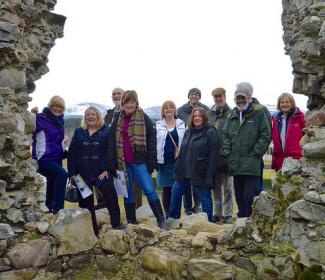Cooperation Cafe proves to be of great value

In this blog, Programme Co-ordinator for Tyne Esk LEADER Neil Ramsay shares his experience of being part of the team organising the Cooperation Cafe session at the Scottish LEADER Conference.
Following a training session run by The Art of Hosting along with James Ede of The Art of Participatory Leadership a small group of trainee leaders took on the challenge of hosting an innovative Pro-action Cafe style event at the Scottish LEADER Conference 2016.
The Pro-action Cafe format aims to create interesting and new conversations on topics chosen and developed by participants at the event. The trainee leaders were drawn from the Scottish Rural Network, the Scottish Government and the Local Action Groups (LAGs) ensuring there was a broad spectrum of knowledge in the design of the event.
The cafe attracted LAG members and staff from 24 different LAGs and LAPs (Local Area Partnerships), many of whom were new to LEADER and had made few links with other LAGs prior to the conference.
The aims of the event were firstly to strengthen relationships between LAGs, to share experiences, to showcase innovative projects, catalyse new ideas and to match potential projects and partnerships.
Up to that point the conference had been quite traditional with speakers, workshops and site visits but the Cooperation Cafe was a new way to involve people in LEADER and think about solutions to problems.
The hosting team had spent some time designing the event, which started with a ‘calling question’ that would ‘call’ attendees to volunteer a question that they’d like to explore.
The calling question was "what cooperation projects would allow us to make best use of our resources to serve our communities?" and the topics that this question drew out were about engaging young people, addressing fuel poverty, developing adventure tourism in remote communities, developing a map of strategic cycle and walking routes, rural enterprise support and visitor management of over-visited sites. A number of topics were raised that the group didn’t have the time to explore further, which were combating isolation among older people, Day of the Region Cairngorms pilot and a community development research project with SRUC.
Once a set number of callers had come forward with questions they took place at a table and all other attendees joined them for three separate rounds of discussions.
Coming at the end of the conference after two days of networking and talks, it was important that there was a lot of tea and coffee on hand to fuel the discussions. The "harvest" documents that captured the discussions are the main outputs from the day and are available in the SRN's Cooperation Cafe report.
However, the process itself was of great value to the callers, participants and to the hosting team and so there are likely to have been a great many more outcomes resulting from it.
More information
- Visit the Cooperation offers section to see information on the project proposals
- Download the Cooperation Cafe report to find out more about the session and see outputs from the day
- Check out the Event report: Scottish LEADER Conference 2016 for presentations, photos and tweets from the event


